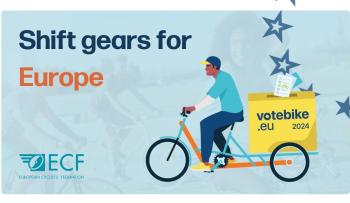
Cycling News from Washington and the World
ECF Secretary General Bernhard Ensink had a busy week representing cycling in Washington, USA in January 2015. On his agenda was the annual meeting of the Sustainable Low Carbon Transport network, (SLOCAT); the Transforming Transportation conference of the World Bank and the World Resources Institute; and a bilateral meeting with the World Bank’s Senior Directors and the Global Environment Fund to put cycling on the agenda for global cycling investment.
With all that happening he also found time to monitor happenings at the world’s leading scientific transport conference, the Transport Research Board.
This has several benefits for cycling in Europe and globally.
It is an important element of EU policy for Europe to be seen as a global actor on issues such as sustainable development and climate change. So when global and EU bodies talk both must be aware of the potential for cycling in sustainable development and the expertise of Europe’s businesses and cities in the development of cycling. For example the World Resource Institute was presenting their view on the climate change issue a week later at the European Economic and Social Committee (one of the EU-institutions with an advisory role to the EU Commission and Parliament).
The political discussions about transport in Europe and worldwide are framed by issues such as the Sustainable Development Goals process of the UN and UN Climate Change summits. ECF uses our World Cycling Alliance as a platform to get cycling more on to these global agendas.
ECF/WCA’s current approach includes:
1) Representing with SLOCAT to get cycling higher on the agenda and lobbying with the network on global level for sustainable transport.
2) Getting more interest for investments in cycling projects from the Development Banks, the World Bank and funds like the Global Environment Facility.
3) Working with UN-Habitat to get cycling higher on the global agenda for a sustainable development of cities.
From his week in Washington Bernhard made four “key observations” that will inform the work of ECF/WCA, our networks and our partnerships with other sectors.
1. Since ECF became an active member of SLOCAT and started presenting cycling at world policy events cycling has risen strongly the agenda of the network and cycling got more mentions than ever at the World Bank / World Resource Institute conference Transforming Transportation 2015. This was immediately followed by a really positive World Bank blog article on the 4th of February which references ECF’s work and partners like World Bicycle Relief.
2. The World Bank and GEF have an interest in investing in cycling projects. But they are ‘client oriented’. This means that investment only happens if countries and cities come up with sound project plans for cycling or where cycling is integrated in a package of projects. This means our lobby work to raise international awareness of cycling must be matched by work on the side of their (potential) clients to get cycling projects into the project plans of countries and cities.
We know this approach works. This exactly matches our successful strategy in Europe where our “€6billion for cycling” campaign has already released the first €2billion potential investment by the EU and now needs great national projects to pull down more money.
4. ‘Big Data’ is a big thing on global level. This is a challenge for us as we struggle for quality date even in Europe. In developing countries it is much worse. The threat is that if cycling is not in the statistics that cycling will not be monitored and therefore will probably play a smaller role in concrete action and project plans than it should. So we must invest in better studies of cycling’s global potential and we have started a joint project with the UCI Advocacy Commission to try and get a first set of new information.
Regions:
Network/Project Involved:
- Log in to post comments
Contact the author
Recent news!
Contact Us
Avenue des Arts, 7-8
Postal address: Rue de la Charité, 22
1210 Brussels, Belgium









